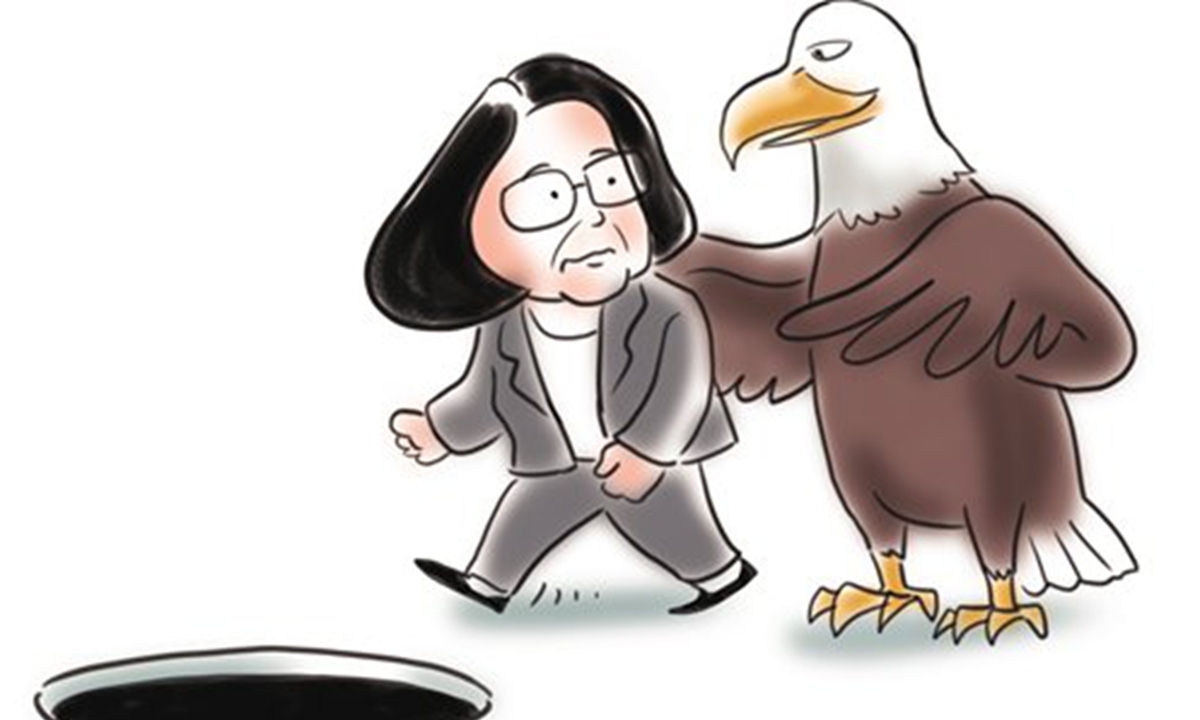US dare not escalate the Taiwan tension
By Xin Qiang Source: Global Times Published: 2020/9/22 20:08:40

Illustration: Liu Rui/GT
Hsiao Bi-khim, the island of Taiwan's representative to the US, changed her job title on her Twitter account to "Taiwan Ambassador to the US" on Monday. Last week, US Ambassador to the United Nations Kelly Craft met with the island of Taiwan's top official in New York and supported Taiwan's participation in the UN.There have been a lot of diplomatic niceties between the US and the island of Taiwan recently.
That Hsiao changed her title from "representative" to "ambassador" is an act of scam. Some officials in the US State Department may already know it, but such behavior will not be authorized by the US leadership. This tactic of "salami slicing" is something Taiwan has always been using. As long as the US does not object, such moves will become routine or even what they call a "diplomatic breakthrough."
The island of Taiwan and the US are likely to have more "diplomatic" activities in the future. The US may support the island of Taiwan's entry into some international organizations, such as the International Criminal Police Organization and the World Health Organization, to increase its participation and presence on the world stage. There might be more US arms sales to the island. The US may also allow Taiwan high-level officials to visit the US or hold virtual meetings and dialogues.
Last week, US Undersecretary of State Keith Krach visited the island of Taiwan in the name of attending the memorial service of former Taiwan leader Lee Teng-hui. He was the highest-ranking State Department official to visit Taiwan in 41 years.
Yet, it is highly unlikely that the US will send higher officials to the island before the November presidential election. The tensions between China and the US have almost reached a tipping point. The Chinese mainland has used strong military means to warn the inappropriate visit. If tensions escalate further, there could be a fourth Taiwan Straits crisis. In the midst of US President Donald Trump's election campaign, he may not want or dare to provoke China further, given what diplomacy entails.
If the US and the island of Taiwan take further actions, the Chinese mainland will increase pressure on them in political, economic, diplomatic and military aspects, including terminating the Economic Cooperation Framework Agreement with the island of Taiwan.
China has many cards to play. The key is which and how China is willing to play. Some people in the US and the island of Taiwan may think the Chinese mainland has few cards to play and the mainland is afraid to play cards even if it has. However, this is a grave strategic miscalculation.
The recent appeal of US Congressman Tom Tiffany to establish US-Taiwan diplomatic relations will never come true. Some anti-China politicians in the US, especially members of Congress, lack basic diplomatic and political knowledge about international affairs. Nobody, not even Trump, would dare to make such a decision because that will lead to the destruction of China-US relations, or even a continuing conflict between China and the US. It's a cost and a risk that no US president or politician is willing to take.
After November's presidential election, "diplomatic" interaction between the island of Taiwan and the US is likely to be seen as routine on both sides. If Trump is reelected, the possibility of further escalation cannot be ruled out. If Democratic candidate Joe Biden wins, he might be more restrained. Supporting the island of Taiwan has already become the political correctness in the US system. Playing the Taiwan card, cracking down on the Chinese mainland and strengthening US-the island of Taiwan relations, especially in diplomacy, will remain as the established policy in the US, no matter who takes office.
The author is deputy director of the Center for American Studies at Fudan University. opinion@globaltimes.com.cn
Posted in: VIEWPOINT